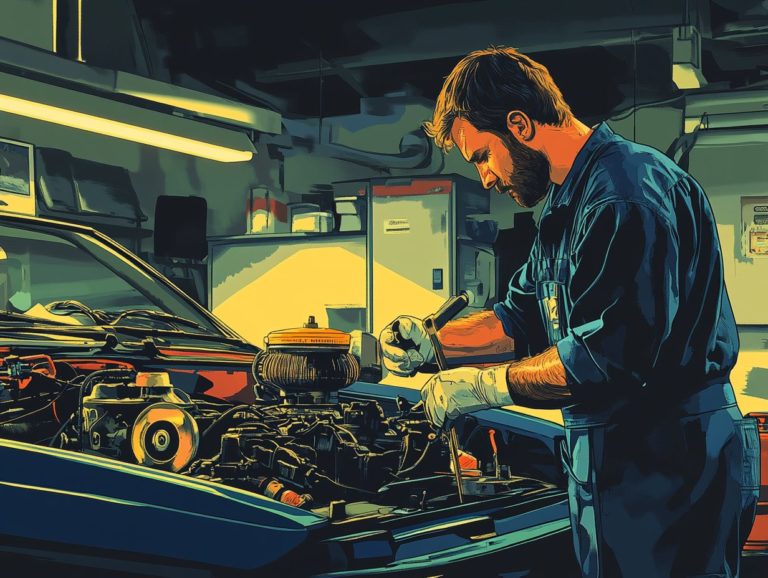5 Common Engine Problems and Solutions
Your vehicle’s engine is its beating heart! When something goes awry, it can lead to both frustration and costly repairs.
From the engine refusing to start to strange noises that signal trouble, knowing what’s behind these problems can save you time and money.
This piece delves into five prevalent engine issues, their underlying causes, and effective solutions.
It highlights the warning signs to keep an eye on, offers prevention tips, and explains how a professional mechanic can lend a helping hand.
Are you ready to ensure your engine runs like a dream?
Contents
Key Takeaways:
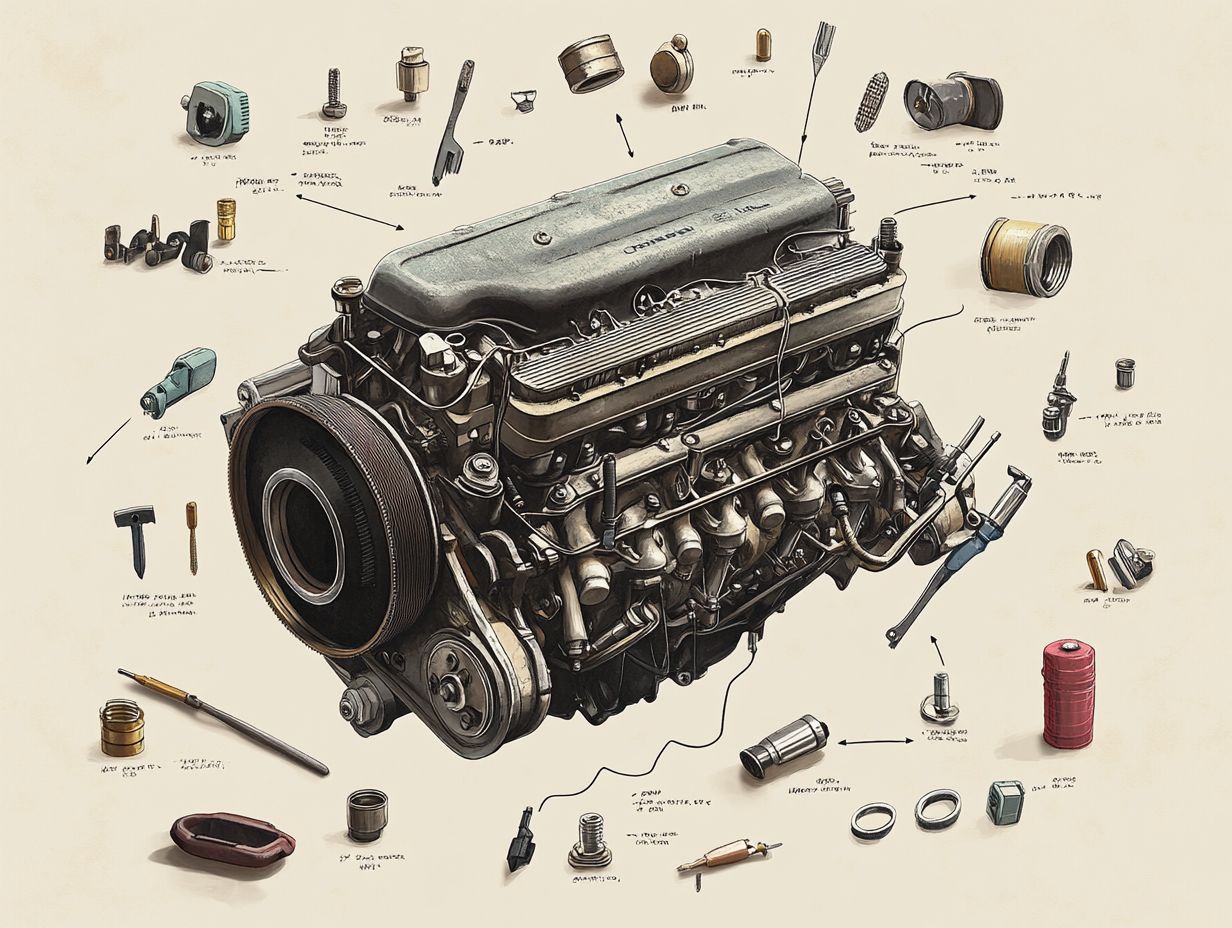
- Regular maintenance and proper use of fuel can prevent common engine problems like stalling and misfiring.
- Strange noises and engine overheating can be warning signs of serious engine issues that require immediate attention!
- Professional mechanics can help diagnose and repair engine problems, but it’s important to be aware of the costs involved.
1. Engine Won’t Start
When your engine refuses to start, it can be incredibly frustrating! This experience often leaves you stranded and unsure of your next move especially if you’re one of the many car owners in Illinois who depend on their vehicles daily.
Common culprits behind this issue include faulty spark plugs, fuel injector problems, or even complications with the engine control unit, which manages engine performance.
Local service centers like Lake Elsinore Honda and Mark s Auto Service are invaluable resources, ready to assist you in servicing your vehicle properly to prevent such engine failures.
Electrical issues, like a dead battery or a malfunctioning alternator, can deprive your engine of the power it needs to engage. On the flip side, fuel delivery problems, such as clogged fuel filters or failing fuel pumps, can starve the engine of essential resources.
Mechanical failures, including a broken timing belt or a damaged starter motor, can render your vehicle completely inoperable. This is why regular engine diagnostics and preventative maintenance are essential; they give you the power to detect and tackle potential problems before they escalate.
Local car manufacturers and service centers are crucial in this equation! They provide the expertise and insights needed to keep your vehicle running at its best.
2. Engine Misfires
An engine misfire is a common issue that can significantly impact your vehicle’s performance. This often stems from an imbalance in the mix of air and fuel needed for your engine to run or faulty components such as spark plugs and fuel injectors.
When you experience a misfire, you might notice a reduction in engine performance that manifests as stuttering or hesitation during acceleration. This can create an unsettling driving experience, especially when quick responses are necessary.
A misfiring engine tends to burn fuel less efficiently, leading to increased fuel consumption and a noticeable drop in miles per gallon. It s essential to address these symptoms through regular engine maintenance and timely servicing to catch any faulty components before they escalate into more expensive repairs.
Performing simple checks, like replacing worn spark plugs or resolving fuel delivery issues, can significantly boost your engine s performance and reliability.
3. Engine Overheating
An overheating engine can spell disaster if you don t address the issue swiftly! This often stems from problems within the engine coolant system think coolant leaks, a faulty radiator, or a thermostat that s gone rogue.
Stay alert for warning signs like steam billowing from under the hood, unusual odors emanating from the engine, or that pesky check engine light flickering on your dashboard. These indicators suggest that something might be off.
Preventive measures are essential. Regular maintenance is key; make it a habit to check and top off your coolant levels and ensure that your oil pump is functioning properly. This proactive approach can help you sidestep overheating headaches.
Don’t underestimate the value of cleaning your radiator and keeping a close eye on the temperature gauge. These steps will help you catch potential issues before they snowball, ensuring your vehicle operates smoothly and efficiently.
Schedule your engine check today to keep your vehicle running smoothly!
4. Strange Noises Coming from the Engine
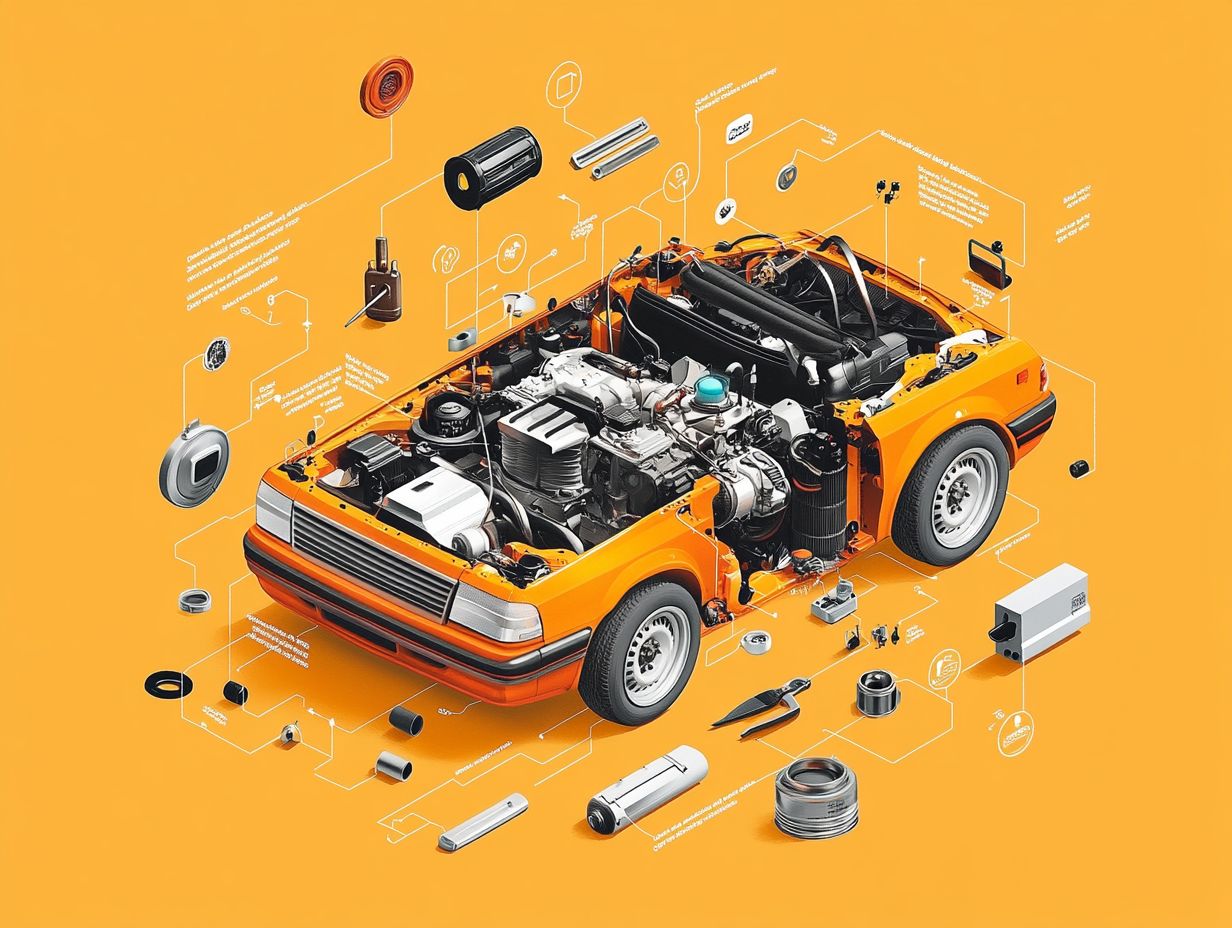
Strange noises emanating from your engine should raise an immediate red flag, signaling that something may be amiss. These sounds could point to issues such as oil leaks or potential problems with engine components that definitely warrant professional diagnostics.
You might hear a knocking sound, which often suggests troubles with the pistons or connecting rods. A ticking noise could indicate stuck lifters or insufficient lubrication. If you hear a grinding noise, that s usually a clear sign of trouble with the gears or bearing. Ignoring it could lead to catastrophic failure.
Addressing these issues with timely diagnostics and repairs is essential. For example, understanding common radiator issues and fixes can prevent neglect that may lead to far more severe and costly engine damage later on.
Regular maintenance checks can help you catch these problems early. This ensures not only the longevity of your engine but also a more dependable driving experience.
5. Engine Stalling
Engine stalling isn t just an inconvenience; it can also be downright dangerous. It often stems from issues like oil sludge buildup, faulty fuel injectors, or damaged sensors that disrupt engine performance.
Stay ahead of engine issues with regular maintenance it s your best defense! Neglecting routine oil changes can lead to sludge accumulation, which restricts proper lubrication and sets the stage for catastrophic engine failure.
Don t ignore your check engine light; it signals problems needing immediate attention! Always keep an eye on it.
Watch out for these warning signs:
- Unusual noises
- A decrease in acceleration power
- Erratic idling
These could all signal potential problems lurking beneath the surface. By addressing these symptoms promptly, you can save yourself from costly repairs and ensure a smoother, safer driving experience.
What Are the Most Common Causes of Engine Problems?
Understanding the most common causes of engine problems is essential for vehicle owners who want to maintain optimal engine performance and avoid costly repairs. Being aware of 5 common signs of engine trouble—such as faulty combustion parts, oil starvation (not having enough oil in the engine), and neglected engine maintenance—can lead to significant failures if not diagnosed and addressed promptly.
For example, faulty combustion parts such as worn spark plugs or damaged fuel injectors can drastically diminish your engine’s efficiency. This results in decreased fuel economy and increased emissions. In fact, statistics show that about 20% of vehicle performance issues stem from these components.
Oil starvation, often a result of infrequent oil changes or leaks, can lead to catastrophic engine damage if left untreated. Engines with low oil levels are at a much higher risk of failure, according to studies. By implementing regular maintenance checks, including oil level assessments and part inspections, you can significantly reduce the likelihood of these engine problems, ensuring your car remains in peak condition for years to come.
How Can These Problems Be Prevented?
Preventing engine problems goes beyond simply reacting to issues when they surface; it’s about embracing effective preventative maintenance strategies. This includes conducting regular engine diagnostics and ensuring timely servicing of your vehicle to inspect critical components like spark plugs and lubrication systems, as well as being aware of common repairs in older cars.
These practices are vital for keeping your vehicle running smoothly and extending its lifespan. For example, routine oil changes should be performed every 3,000 to 5,000 miles, depending on the type of oil you use and the manufacturer’s recommendations. Inspecting spark plugs every 30,000 miles can significantly enhance engine performance, as worn plugs can cause misfiring and reduce fuel efficiency.
Committing to thorough vehicle servicing at regular intervals, as outlined in your owner’s manual, ensures that essential parts like the air filter and battery are functioning optimally. This proactive approach not only helps maintain your vehicle s performance but also minimizes the risk of unexpected breakdowns.
What Are the Warning Signs of Engine Problems?
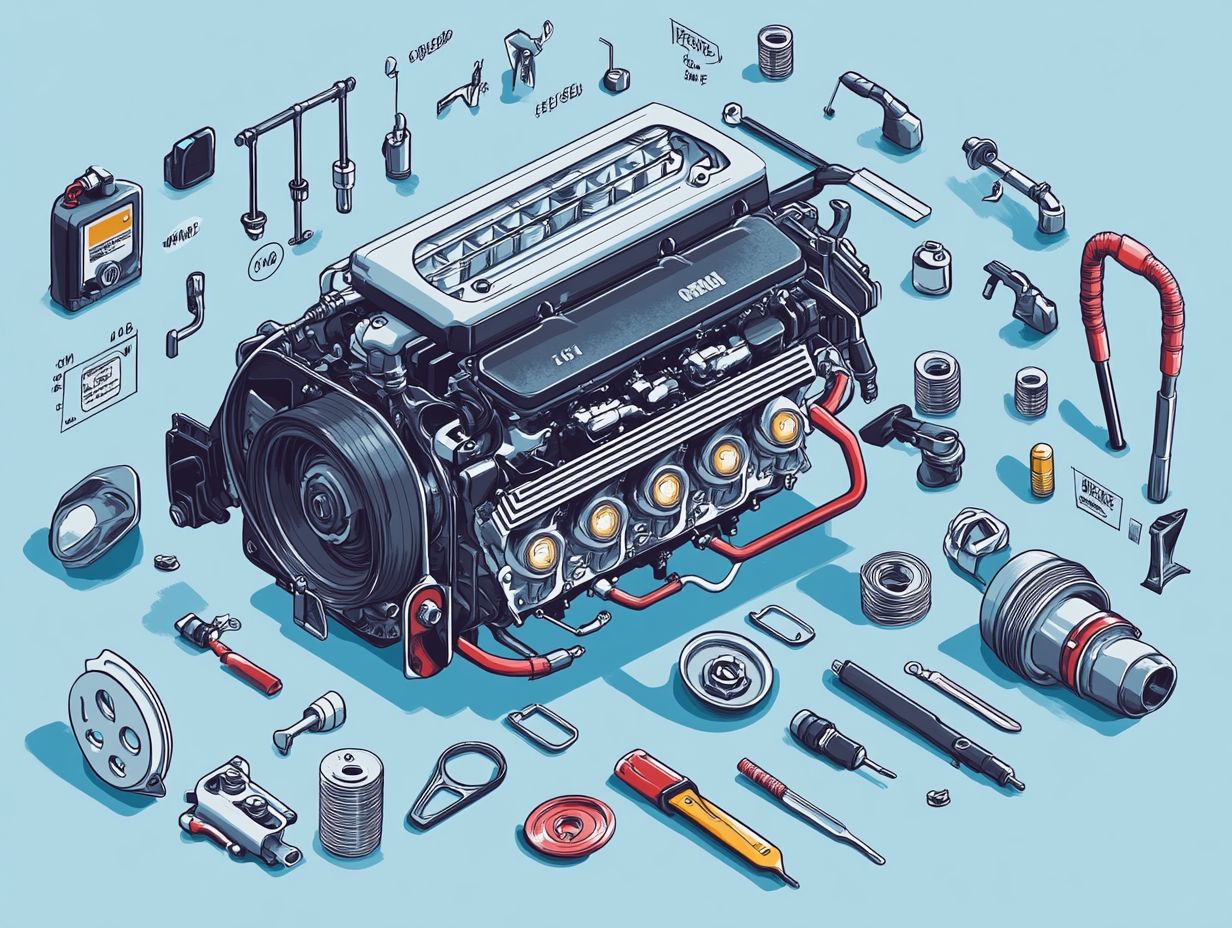
Being aware of the warning signs of engine problems can truly be a lifesaver for you as a vehicle owner. Indicators like the check engine light, strange engine noises, coolant leaks, and noticeable declines in engine performance are essential alerts to potential issues that you should never ignore.
Recognizing these early signals can be the difference between a minor repair and a costly breakdown. For instance, if you hear a persistent or unusual sound coming from the engine compartment, it could signal serious mechanical problems.
Similarly, a drop in performance like decreased acceleration or increased fuel consumption might point to complications within the fuel system or ignition components.
Visible signs such as leaks beneath your vehicle or an overheating dashboard gauge should always raise red flags. Don t wait! Consult a qualified mechanic as soon as you notice these warning signs.
Prompt attention can prevent the situation from worsening, ultimately saving you both time and money in the long run.
What Are the Different Types of Engine Repairs?
Engine repairs can vary significantly based on the specific issues you re facing. Whether it s replacing faulty combustion parts, fixing oil leaks, servicing fuel injectors, or conducting comprehensive diagnostics, the scope of repairs can differ greatly.
For example, if your vehicle is struggling to start or misfiring, you might need to address the ignition system. This could involve replacing spark plugs (which ignite the fuel-air mixture) or ignition coils (which supply power to the spark plugs), with costs ranging from $100 to $500.
Persistent oil leaks can be a sign of worn gaskets or seals, often leading to repair costs between $150 and $1,200, depending on the severity of the damage.
If you notice a sudden drop in fuel efficiency, a thorough cleaning or replacement of the fuel injectors may be in order, typically costing between $200 and $600.
By understanding these common issues and their associated repairs, you can make informed decisions and budget effectively for your vehicle s needs.
How Can a Professional Mechanic Help with Engine Problems?
A professional mechanic can be your best ally when it comes to tackling engine issues. They provide expert diagnostics and repairs that get your vehicle back on the road swiftly and safely, whether you choose Lake Elsinore Honda or Mark s Auto Service.
Their experience enables them to identify underlying problems that might not be immediately visible, which prevents minor hiccups from snowballing into expensive repairs.
When you opt for certified service centers, you not only gain peace of mind but also ensure that skilled technicians use high-quality parts and cutting-edge diagnostic tools. This dedication to excellence plays a significant role in enhancing the overall longevity of your engine.
By committing to regular maintenance and timely repairs performed by professionals, you can boost fuel efficiency, lower emissions, and ultimately extend your vehicle’s lifespan. This makes it a smart investment for any discerning car owner.
What Are the Costs Associated with Engine Repairs?
The costs associated with engine repairs can vary widely. They are influenced by the type of repairs required, the make of your vehicle, and whether you opt for authorized service centers like Honda or choose independent shops for maintenance.
Labor rates can shift based on the expertise of the technicians and the geographic location of the service center, ultimately affecting your overall expenses. The prices of replacement parts can also vary; original manufacturer parts generally come with a higher price tag compared to aftermarket alternatives.
Diagnostic fees can further inflate initial costs, particularly if the issue isn’t immediately apparent. To navigate these unpredictable expenses, it s prudent to set aside a budget for regular preventative maintenance.
By taking this proactive approach, vehicle owners can identify potential problems early on, ultimately saving money and minimizing the risk of facing hefty repair bills down the road.
Frequently Asked Questions
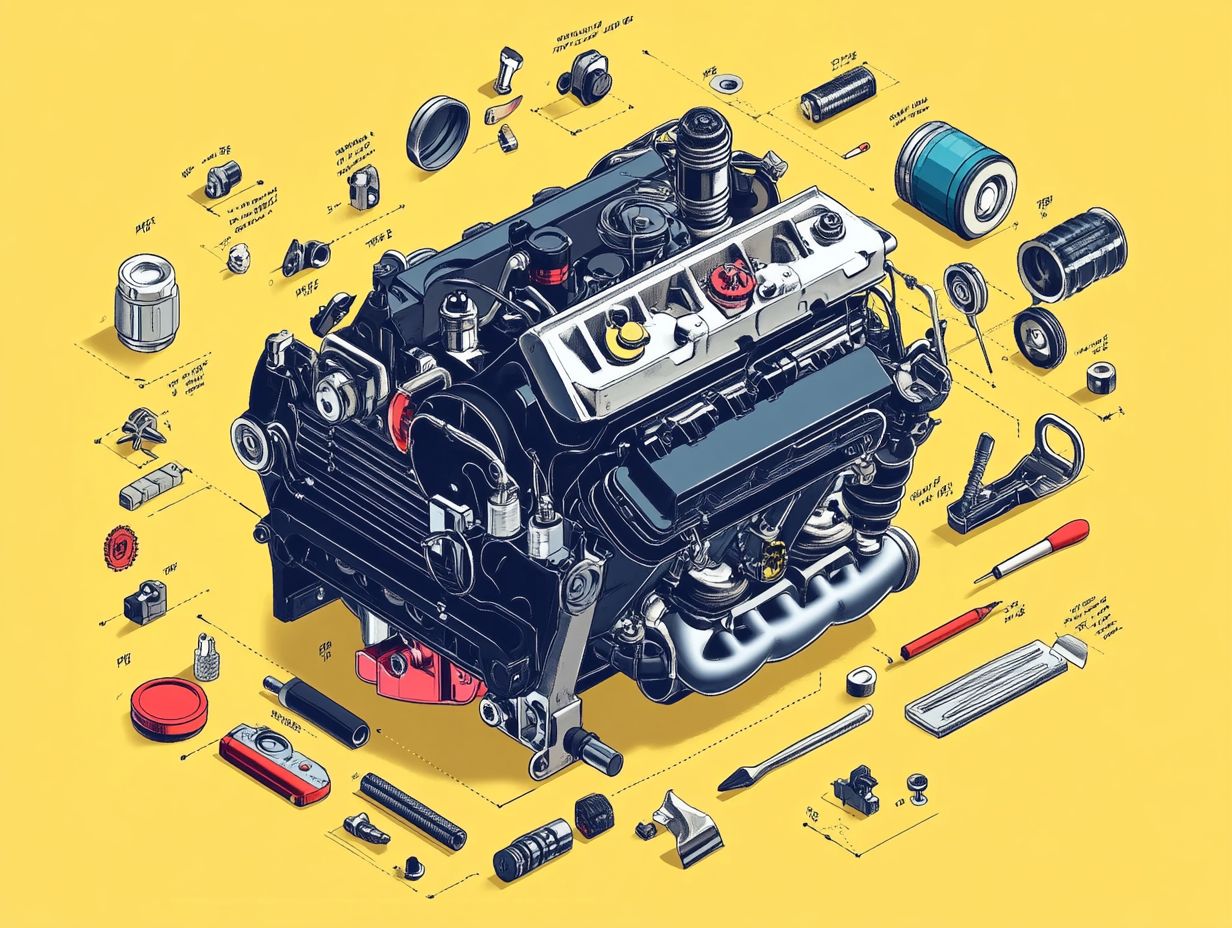
What are the most common engine problems and solutions?
Common issues include overheating and oil leaks. Other problems are misfires, low oil pressure, and fuel system problems like engine knocking.
Regular maintenance can help prevent these problems. For instance, keeping proper oil levels and addressing issues quickly are essential for a healthy engine, as outlined in the article on 5 common warranty issues and solutions.
How can I prevent my engine from overheating?
To avoid engine overheating, regularly check and replace your coolant. Use the correct type of coolant for your engine and keep your radiator and cooling system clean.
Avoid driving in extreme temperatures, and stop driving if your engine temperature gauge rises.
What should I do if my engine is leaking oil?
If you notice oil leaking from your engine, don t wait! Get it checked by a mechanic right away. Oil leaks can be caused by worn seals, damaged parts, or loose oil filters.
Addressing an oil leak promptly is crucial to avoid serious engine issues.
Why is my engine misfiring and how can I fix it?
Engine misfires can stem from faulty spark plugs, which help ignite the fuel in your engine, or fuel system problems.
Clogged air filters can also cause this issue. To fix it, you may need to replace spark plugs, clean or replace filters, or consult a mechanic for deeper issues.
What can cause low oil pressure in an engine?
Low oil pressure may arise from a leak in the oil system, a clogged oil filter, or a faulty oil pump, which circulates oil throughout your engine.
This condition can indicate a larger engine problem, so have it checked by a mechanic to prevent serious damage.
What should I do if I hear my engine knocking?
If you hear your engine knocking, stop driving immediately! It could lead to serious damage. This sound can be caused by worn bearings, damaged pistons, or low oil levels.
Have a mechanic inspect and repair the issue as soon as possible.


